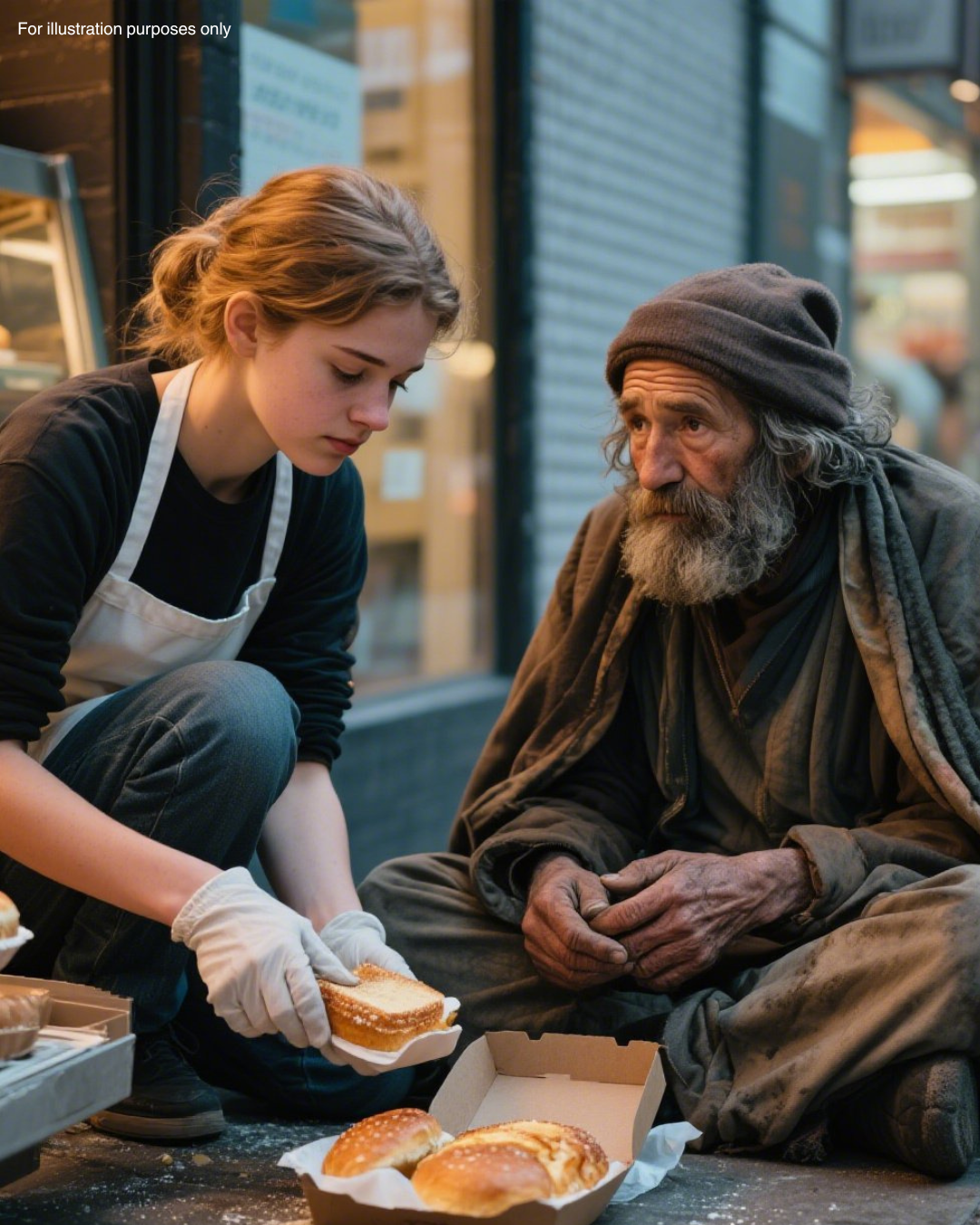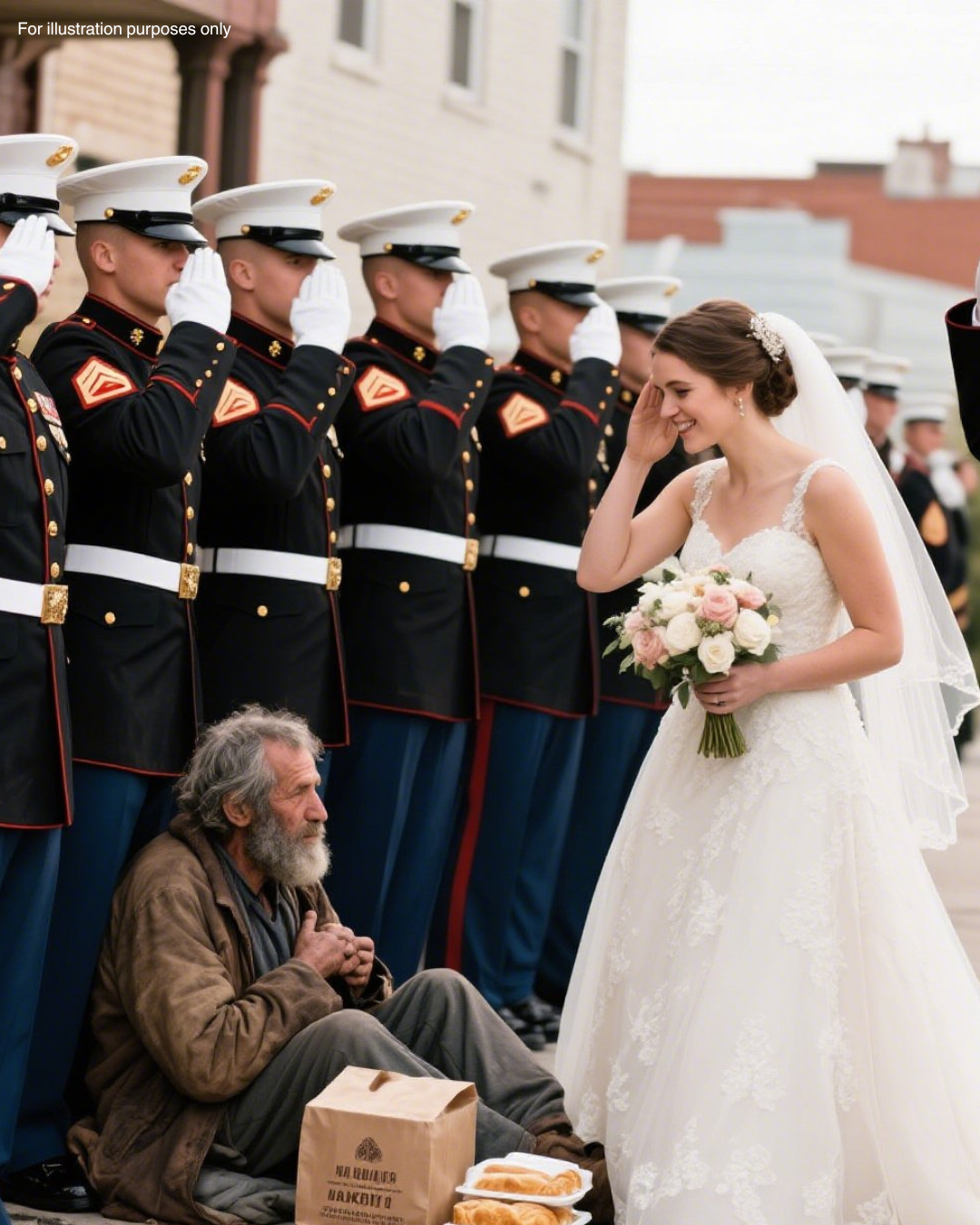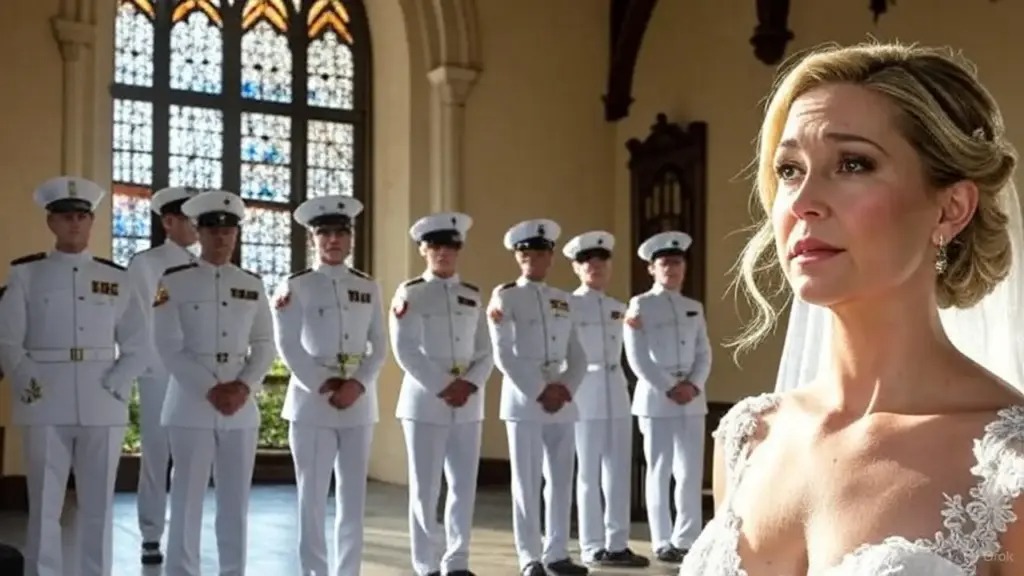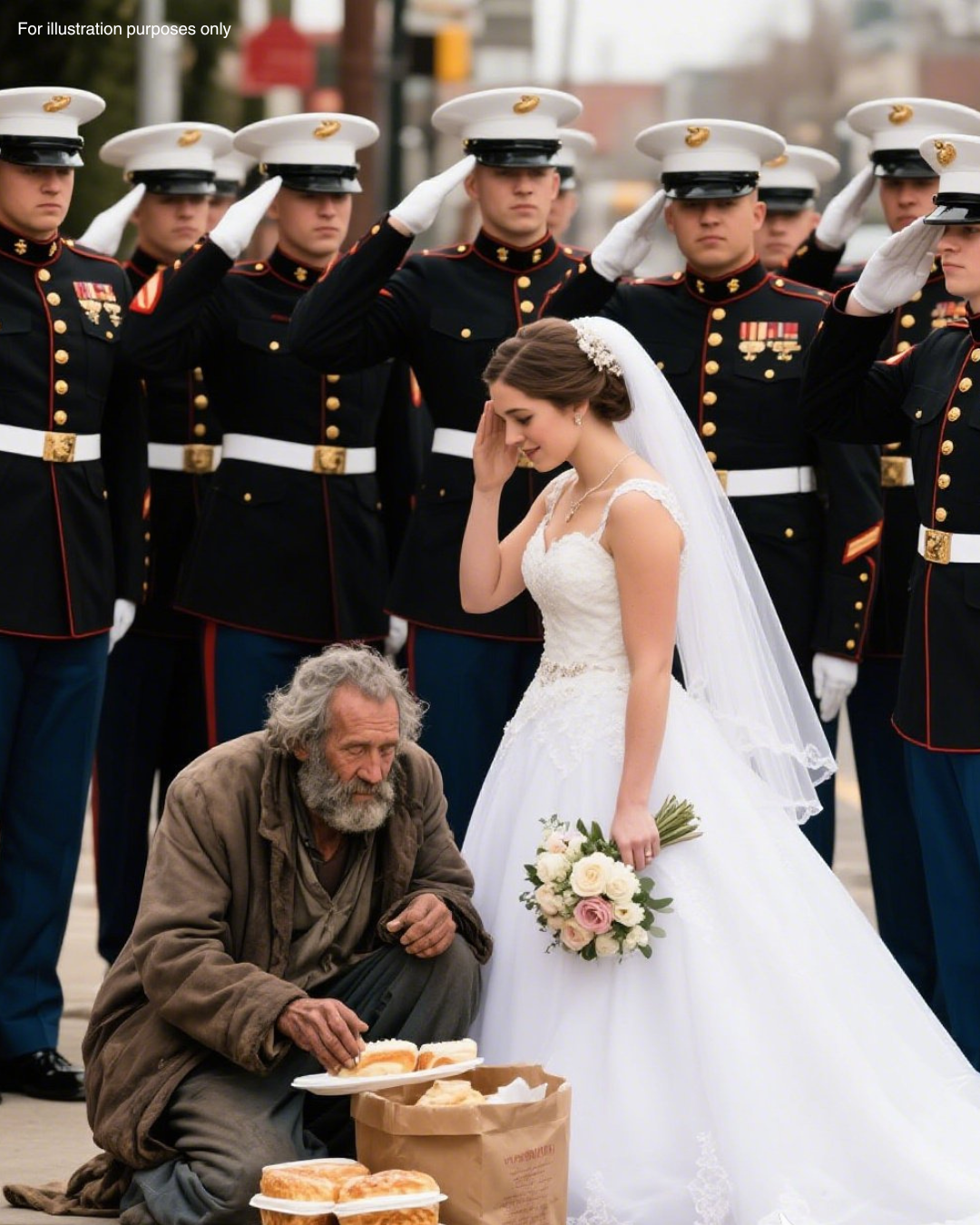Type, I’m outraged, if you believe kindness should never be judged. Emily Sanchez started each workday at 4.30 a.m., arriving at Sunrise Bakery in San Diego well before the morning rush. At 30, she had already spent six years as the head pastry chef, known throughout the neighborhood for her delicate croissants and melt-in-your-mouth cinnamon rolls.
But among her co-workers, Emily was known for something else, her daily ritual, that began the moment she finished the morning’s first batch of pastries. Each day, without fail, Emily would carefully wrap a fresh pastry and pour a cup of coffee into a to-go container. She would slip out the back door and place the items on a bench near the bus stop, along with a handwritten note, wishing you a peaceful day.
The recipient was always the same, an elderly man with silver hair and a tattered coat, who never begged, never approached customers, but sat quietly on the same bench each morning. In six years, Emily had never asked his name, and he had never offered it. Her co-workers often mocked her behind her back.
She’s wasting good product, one would say. One day he’ll take advantage of her kindness, another would predict with certainty. Three months ago, the bakery had come under new management.
During Emily’s performance review, her supervisor had expressed concern. Your personal charity work? It’s admirable, he’d said carefully. But some customers have mentioned feeling uncomfortable.
Perhaps you could support a proper homeless shelter instead? Emily had nodded politely, but changed nothing. She simply adjusted her routine. Arriving 15 minutes earlier, leaving the food before anyone else arrived.
She thought no one had noticed until last week, when a new employee spotted her returning from her morning mission. She’s been feeding that bum for five years now, the employee whispered to a customer loud enough for Emily to hear, every single day. The customer shook her head with a mix of pity and judgment.
Poor thing, thinking she’s making a difference. Emily had pretended not to hear, continuing to roll dough with the same care she always showed. But the words stung, not because she cared what others thought, but because they couldn’t see what she saw.

A human being, not a problem to be avoided. You’re too soft-hearted, her mother had told her when she announced her engagement to Marco, a firefighter who understood her morning ritual, because he had his own ways of helping strangers. Always picking up strays, always giving away what you’ve earned.
But Emily knew something others didn’t, that giving wasn’t about recognition. It was about seeing the invisible people that others walked past every day. Have you ever seen good people misunderstood? Type.
So unfair. Emily had never actually spoken with the elderly man. Their interaction was limited to brief nods and occasional eye contact, but one rainy morning in December, she noticed him shivering on his bench.
Without hesitation, she placed her own worn wool scarf beside the usual breakfast. The next day, she found a note scrawled in shaky pencil on the back of her usual napkin. Thank you for seeing me as a person.
Emily kept that note in her wallet, taking it out occasionally when the world seemed particularly cold or indifferent. As her wedding day approached, Emily naturally ordered her cake from Sunrise Bakery, inviting all her colleagues to the ceremony. Marco had teased her gently about inviting the entire neighborhood, but supported her inclusive nature, one of the many reasons she loved him.
Two days before the wedding, an unmarked hand-delivered letter arrived at the reception venue. The envelope addressed simply to the bride. Emily Sanchez contained a card with neatly penned well-wishes and a single line that puzzled the planner.
Tomorrow I will come, not for cake, but to honor a debt. There was no signature, no return address. Emily wondered if it might be from a distant relative or one of Marco’s firefighter colleagues.
But something about the handwriting stirred a faint recognition she couldn’t quite place. On the morning of her wedding, Emily was a bundle of nerves and excitement as she prepared in the church’s bridal room. Through the window she could see guests arriving, family members, friends, co-workers in their finest attire.
Then, standing somewhat awkwardly at the church entrance, she spotted him, the elderly man from the bus stop, now wearing a threadbare but carefully pressed suit, his shoes polished despite their worn condition. His silver hair was combed neatly, and for the first time Emily could see his face clearly, weathered by time and hardship, but dignified. Several guests had noticed him too.
Emily overheard their whispers through the partially open door. Who invited the homeless man? Don’t tell me you invited him to the wedding? Is he looking for handouts at a wedding now? Emily’s heart sank at their words. Without thinking about the carefully planned processional, the photographer’s schedule, or any other wedding protocol, she gathered her white gown in her hands and rushed from the bridal room.
She crossed the church foyer in a flutter of white, ignoring the gasps from guests and the frantic calls of her wedding planner. When she reached the elderly man, she enveloped him in a warm embrace, tears threatening to ruin her carefully applied makeup. I still remember your eyes, the first time in 2017, she whispered.
He smiled, a genuine smile that transformed his weathered face. I remember every single morning you treated me like a human being, he replied in a voice stronger and clearer than she had imagined. As Emily linked her arm through his to escort him inside, her wedding planner approached, confusion evident on her face.
Emily, the ceremony is about to start. Who is this gentleman? Before Emily could answer, the distinct sound of vehicles pulling up sharply outside the church caught everyone’s attention. The double doors at the church entrance swung open with military precision.

If you’ve ever misjudged someone, type, I was wrong. The church fell silent as twelve United States Marines in full dress blues entered in perfect formation. Their shoes gleamed, their white gloves immaculate, their faces composed in solemn dignity.
They moved with the synchronized precision that comes from years of discipline and shared purpose. Guests froze in mid-conversation. Someone dropped a champagne glass, the shattering sound echoing in the sudden silence.
The lead Marine, a captain with Duncan on his nameplate, stepped forward. With practiced precision, he came to attention before Emily and rendered a perfect military salute. On behalf of Alpha Company, Third Battalion, Fifth Marines, he announced, his voice carrying throughout the church, we are here to honor the woman who silently sustained a hero for six years.
Emily stood stunned, her hand still holding the elderly man’s arm. Confused murmurs rippled through the wedding guests. Captain Duncan turned slightly, gesturing toward the elderly man at Emily’s side.
This is Sergeant Victor Hale, a Marine who saved nine lives during an ambush in Fallujah in 2004. After losing his entire family to a car accident in 2016, he chose to disappear from society, never once using his military benefits or revealing his identity. The revelation sent shockwaves through the gathering.
Guests who had been whispering just moments before now stared in disbelief. Another Marine stepped forward, presenting Emily with a shadow box containing a medal and a faded photograph. The image showed a younger Victor Hale, carrying a blood-covered Marine through what appeared to be a war-torn street.
And in the background, unmistakably, was a younger version of Captain Duncan. Sergeant Hale carried me four blocks under enemy fire after I took shrapnel to both legs, Duncan explained, his voice steady but emotional. He returned for eight more Marines that day, despite being wounded himself.
His actions earned him the Silver Star, which he never claimed. Duncan bowed his head slightly before continuing, If not for him, I wouldn’t be standing here today. And if not for you, Ms. Sanchez, he might not have survived to see this day.
Emily’s makeup was beyond saving now, as tears flowed freely down her cheeks. I never knew, she whispered, looking at Victor with new understanding. That was the point, Victor replied gently.
I didn’t want to be thanked for doing my duty. After losing my wife and daughter, I couldn’t bear to be around people who saw me as a hero when I couldn’t even save my own family. He paused, emotion briefly overcoming his composure.
But you, you never asked who I was. You never demanded my story. You just fed me, saw me, left notes that gave me a reason to wake up each morning.
The Marines had arranged themselves in a formal line, creating an honor guard that extended from the church entrance to the altar. Captain Duncan addressed the gathered guests. Ms. Sanchez never knew she was helping a decorated war hero.
She simply helped a human being in need day after day, year after year, without recognition or reward. His gaze swept across the room, lingering on those who had been whispering just minutes earlier. In the Corps, we have a saying, never leave a Marine behind.
Emily Sanchez, who never served a day in uniform, understood this principle better than many who wear the uniform. One of the bridesmaids, tears streaming down her face, stepped forward. I work with Emily at the bakery.
She arrives early every day to bake extra pastries, paying for the ingredients herself, just to make sure he had fresh food. She never told anyone, added another co-worker, shame evident in her voice. We—we teased her for it.
A guest stood up, overcome with emotion. We’re witnessing not just a wedding, but a military honor ceremony. Victor turned to Emily, his weathered hands taking hers.
I came today to give you the only gift I have left—my presence, my truth, and my gratitude. I knew you were getting married because I overheard you mentioning it to a customer. I hope you don’t mind that I contacted some old friends.

Emily smiled through her tears. This is the most beautiful wedding gift imaginable. Marco, the groom who had been watching this unfold with amazement, finally approached, extending his hand to Victor.
Sir, I would be honored if you would join our ceremony. Perhaps walk Emily down the aisle. If you’ve ever received something enormous from a small action type, I owe a debt.
Following their honeymoon, Emily didn’t return to the bakery. Instead, she and Marco used their wedding gift money to start a small program called the Quiet Table, a breakfast service for homeless veterans in their neighborhood. There were no photographers documenting their work, no press releases announcing their mission, just a simple wooden sign with carved letters.
Feeding one person feeds an entire life that might otherwise be forgotten. Victor Hale didn’t appear at the Quiet Table after the wedding, but each month, Emily would receive a postcard from different locations around the country, each bearing the same message. Every breakfast is a salute.
Thank you, Emily. Captain Duncan had explained that Victor was finally using his VA benefits to receive proper medical care and trauma counseling. The Marines had helped him secure housing and reconnect with the military community he had abandoned years ago.
On the first anniversary of their wedding, Emily and Marco arrived at the Quiet Table to find the 12 Marines waiting for them, this time in civilian clothes, each holding a single flower. We’ll be taking shifts volunteering here, Captain Duncan announced. This honor isn’t one we’ll allow to be forgotten.
What had begun as one woman’s daily act of kindness had grown into something much larger. Veterans from across San Diego now knew about the Quiet Table, a place where they could receive a meal without questions, judgment, or the need to explain their circumstances. Emily kept Victor’s original note framed above the serving counter.
Thank you for seeing me as a person. Below it, she had added her own message. Everyone who sits at this table has a story worth knowing.

Six months later, a local news crew discovered the Quiet Table and requested an interview. Emily politely declined, suggesting they speak with the veterans instead. This isn’t about me, she explained.
It’s about seeing the invisible people all around us. On particularly difficult mornings, when supplies ran low or volunteers didn’t show, Emily would remember her wedding day, the moment 12 Marines stood at attention for a simple act of daily kindness. It was all the motivation she needed to continue.
Marco understood completely. As a firefighter, he knew that heroism wasn’t always about dramatic rescues or running into burning buildings. Sometimes it was about the quiet consistency of showing up day after day, offering kindness without expectation of recognition or reward.
You know, he told Emily one evening as they closed up the Quiet Table, when I married you, I got not just a wife, but 12 Marines and a growing family of veterans. Emily smiled. The best kind of family, the kind you choose and the kind that chooses you back.
Type, I will live with kindness if you believe a small meal can save a great soul. Some people have lived as heroes only to die in silence if no one sees them as human beings. Some debts require no money to repay, just the daily dignity of being treated as a person.
Emily didn’t need to know Victor Hale’s identity. She simply saw aging eyes, a hungry stomach, and someone who deserved acknowledgment. Through that small action, a life was preserved, and a unit of Marines was reminded that not everyone who deserves a salute wears a medal.
Sometimes, the person who guards your freedom is quietly eating breakfast under your bakery awning. The homeless individuals we pass on street corners might be former teachers who shaped young minds, nurses who once saved lives, or veterans who carried wounded comrades through gunfire. Their current circumstances don’t erase who they were or who they still are beneath the layers of hardship.
Live with kindness, not for recognition, but so that someday you might witness 12 people bowing their heads for something you never thought to celebrate. In a world obsessed with grand gestures and viral fame, remember that true heroism often lives in the smallest acts of consistent compassion, delivered without an audience. H.C. Stories, Because the Greatest Heroes Often Eat Alone.






